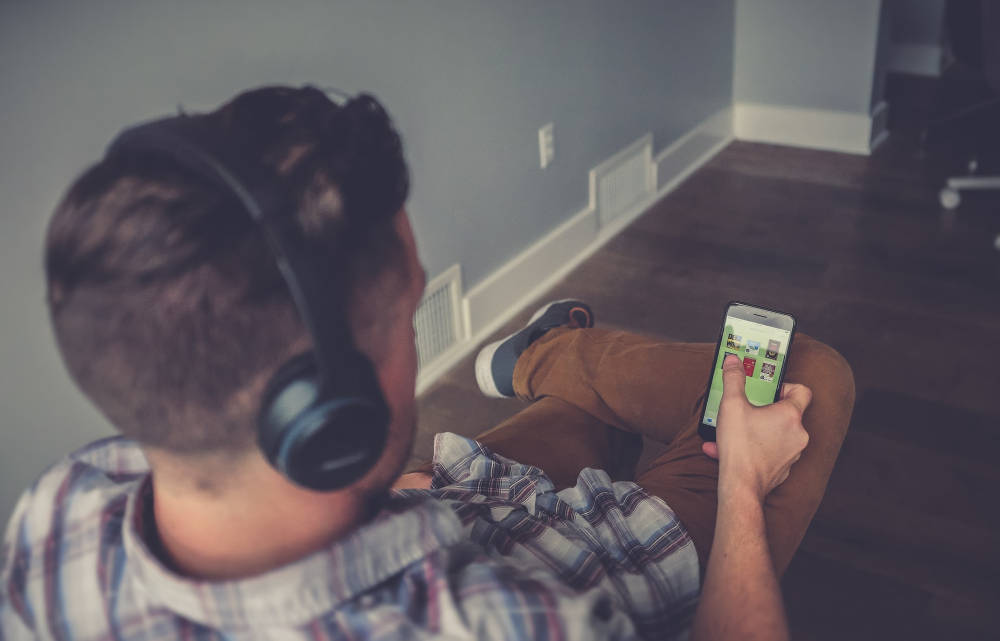[Photo by NeONBRAND on Unsplash]
While most of us are voracious readers, audiobooks are something many of us haven’t embraced fully. When discussed, it boiled down to our inability to pay attention to the narratives. But audiobooks are gaining popularity. Is there a trick or two that we’re missing then? To understand what those may be, we reached out to a few people who consume content here well. Their experiences and pointers are most useful.
Your feedback and comments will be much appreciated.
Have a good weekend!
In this issue
- FF Recommends: How to use audiobooks
- Love in the pandemic era
FF Recommends: How to use audiobooks
A computational neurobiologist, an entrepreneur, a startup founder and a communications strategy consultant tell us why they got hooked, what works and what needs tweaks, and the audiobooks that kept them going.
“We ‘listened’ to stories long before we started reading them. This is like going back to that time.”
By Karthik Srinivasan
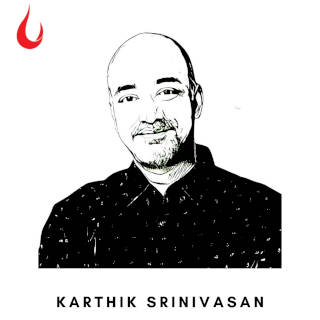
(Karthik is Communications strategy consultant, author of Be Social, and former National Lead, Social@Ogilvy, Ogilvy & Mather)
How I got hooked to audiobooks
Given that my all-time favourite book is Douglas Adams's The Hitchhiker's Guide to the Galaxy, and since I have read it so many times already (and also have seen the movie), I was curious to ‘consume’ the book in other formats. So, I started with BBC's dramatized audiobook version that a friend had shared with me as mp3 files—this was way back in 2008/09 if my memory serves me right. And I was hooked! Post that, most of my book ‘consumption’ has been in the audiobook format.
I had no apprehensions about audiobooks whatsoever even in the beginning. I felt it is a naturally suited format to consume a book since we, as children, first started ‘listening’ to stories long before we started reading them on our own. This is almost like going back to that time in our lives.
I currently use the audiobook format for all kinds of books, fiction and non-fiction. My primary interest is science-fiction, and anthropological sci-fi (xenoanthropology) and first-contact as specific sub-genres within sci-fi. In non-fiction, I pick books on media, mass media, marketing, etc. I may have purchased only about three-four printed books in the past decade—almost all my book consumption is via the audiobook format.
Why do I like it and what’s working for me (and what’s not)
I started by listening to books during my morning jog. I recall being more excited about 'what will happen today (in the story)?' than remembering about the drudgery of waking up at 4:30 am for my jog! It was exhilarating to ‘consume’ an interesting piece of content even as I completed my jog and feeling good about both!
But ever since I started to jog inside the gym/home (treadmills), I have switched to watching TV shows instead of audiobooks. Audiobooks made sense for outdoor run (clubbed with Bluetooth earphones), but in a gym/treadmill, since I can place my phone on the stand, watching something makes more sense to me, and is more fulfilling too.
So, I moved to listening to audiobooks before I sleep. It’s usually 30 minutes before I fall asleep (I set an auto-off for 30 minutes). If the chapter/segment is really interesting, I extend it by 15-30 minutes more and cheat :)
I absolutely love the format, and very rarely have come across readers/narrators who had accents difficult-enough to follow. Mostly, I have come to really admire the art of narration.
It’s perhaps ironic that I do not like podcasts at all! With books (audio), I know what I'm getting into, after reading a gist, review, etc. But with podcasts, I'm supposed to buy into the host of the series/theme and try each episode whether it works for me or not. And unlike printed books, I can't even skim. I don't like that uncertainty that comes with podcasts—they are like blogs I cannot skim.
I have also heard many people complain that they are not able to follow audiobooks because of the speed of reading by the narrator. Most audiobook players have ways to adjust the speed and somehow, I have not found this to be an impediment.
How to make the most of the Audible subscription
The VFM aspect depends on each buyer's attitude towards ownership. With a physical book, you get to own a physical artefact. With ebooks and audiobooks, you don't seem to own anything and everything remains in the cloud. But people could shift their perspective to discover value—with printed books or even ebooks, you may be able to perform only one task at a time: read. But with audiobooks, if you adjust yourself appropriately, you get to perform two tasks at a time—one task that you know really well, done involuntarily (running, driving, gardening, cooking etc.) + listening to an audiobook, making both seem valuable and enjoyable in the process.
The trick would be to build schedules around your daily tasks where you can add audiobook listening in the background. That consistency helps in avoiding what we used to do earlier with printed books—buy and forget them because we don’t find the time to read them.
“I turned to the gory murder genre… where the narrative took unpredictable turns…. But, listening to a book does not have the immediacy of reading it.”
By Collins Assisi
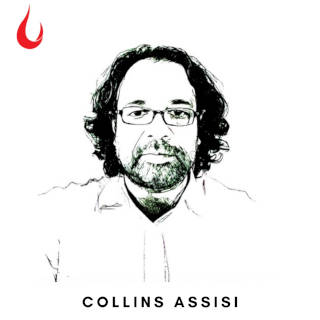
(Collins Assisi is a computational neurobiologist)
How I got hooked to audiobooks
When I was a postdoctoral fellow in the US, my mentor decided to accept a position at a different university that was about a 170 km from where I was. It made perfect professional sense to follow him and continue working on projects we had started together. For several reasons, moving to a different city was not an option. Therefore, I had to drive, two to three times a week, three to four hours each day, to get to work and back. That gave me about 10 hours of time each week where I could not read or watch TV. I had run out of thoughts to think and desperately needed to stay awake on boring roads. Most people would default to music. Unfortunately, I have no ear for music. But I’d rather listen to white noise than the quasi-periodic drone that is music and song. So, audiobooks sounded like a viable alternative.
I tried to find audio recordings of books from various sources. Many were rather badly read and the options were minimal. Finally, I succumbed to buying an Audible membership.
What's working for me (and what's not)
The first set of books I listened to were non-fiction, self-help and the sciency kind—books that I could talk about at parties to sound well-read. It turned out that this was also spectacularly boring. I could barely stay awake as the reader rambled on. One chapter would spill into the next. I needed something more interesting. So, I turned to fiction, in particular the gory murder genre, with lurid scenes and gruesome crime, where the narrative took unpredictable turns.
I found myself driving slower and taking detours just to finish a chapter. Listening to a 30-hour long recitation over weeks takes discipline (for lack of other options). It took me a month to get the hang of listening to audio books. But once I did, I was able to enjoy denser works of non-fiction. I listened, and enjoyed, several books over a few years.
After accepting a position at IISER, Pune, I was offered accommodation on campus and my long commutes stopped. With that, I stopped listening to audiobooks as well. In part because I do not carry a set of headphones with me all the time and in part because listening to a book does not have the immediacy of reading it.
Audiobooks share one characteristic with television—it is a passive medium. I hardly, if ever, look for a word. It is inconvenient to revisit distant parts of an audiobook every time you forget a tangential character. I would never be able to listen to a collection of poems on an audiobook because poetry demands constant engagement. The speed at which the material unfolds is dictated entirely by the reader and not the listener.
With a (paper) book one can speed up or slow down depending on the complexity of the material or how fatigued one is. Speeding up an audiobook to 1.5x makes the recording sound oddly robotic. I remember the interminable description of Ikea furniture in Ms. Salander’s flat in one of Stieg Larsson’s novels. I would have just flipped the page if it were a book.
But after a long hiatus from listening, I recently started listening again to make the time I spend in the gym a little more palatable. This is significantly better than nothing. I am not convinced that it is better than listening to podcasts. Podcasts have a shorter time-scale than audiobooks, and you can listen to a new one every time you go to the gym. In contrast, one can only complete a part of a chapter each day. However, it saves the trouble of finding interesting podcasts every day. I think intermittent listening is going to take some getting used to. However, for a long trip, nothing entertains like a gripping audiobook.
“I’ve had to train myself to be a voracious Audible audiobook listener”
By Akhil Chaturvedi
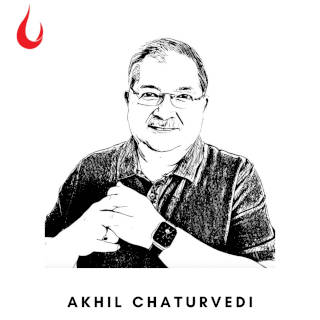
(Akhil Chaturvedi is founder of fashion and lifestyle brand Provogue, and Prozone, a retail mall brand and leads new business supporting startups)
Back in October 2019, I got hooked to listening to audiobooks, mostly during my morning walk. And till date, I have completed 50 to 60 books and spent on an average two hours every day listening to them. During 2020 alone, I covered a distance of 6,000 km, an average of 15-18 km a day. This multitasking has been addictive. I don’t know if I’m listening to audiobooks because I am walking or, I’m walking because I’m listening to audiobooks. I haven’t missed a single day of morning walk ever since I began this journey.
So, what got me hooked?
I’ve enjoyed building a great collection of books over the years in the fond hope that I will eventually find time to read them. But with the advent of quality content on TV and now, infinite possibilities increasingly on the internet, my book purchases started to dwindle as did my reading.
A couple of years ago, after I became more conscious about this trend, I started to look for new ways to reignite my passion for books. I started with Kindle. The format was amazing. It was making book reading a lot more interactive, you could make notes, highlight text, search for your quotes… all that you were doing while reading a paper book plus the convenience of carrying numerous books and notes. Just as I was getting used to it and learning more features about Kindle, along came Audible. I realised my Kindle needed charging and I needed to carry it around, while the audiobooks could be easily accessed on the phone. Kindle had a phone app, but the screen size was appropriate for a tab, not a pocket phone.
I followed an intermediate step that worked for me: before I moved to Audible, I tried out a couple of podcast apps and got used to listening. Podcast apps like Spotify have a lot of free content that you can continue to listen to when walking or driving. Here, the content varies from 15 to 30 minutes and covers a host of topics and interests. It helps understanding the different styles narrators use. If you begin with a tough one, don’t just give up on the format, give it a bit of time and the format will grow on you.
How audiobooks became a part of my life
I eventually settled on audiobooks for two reasons. The voice modulation of a professional narrator made the author’s words come alive. It felt like you were watching a movie unfold even while you close your eyes. Or that you are sitting with the author listening to him one on one. The other clinching reason was it didn’t cause any strain for my eyes—and I could do other things while listening, like walking on the treadmill, driving to work, and traveling.
Because you can pause an audiobook, rewind and repeat at any time there is a sense of liberty. You can check on facts that you may want to clarify, repeat what you might have missed because of the accents or any other reason.
However, I had to train myself to be a voracious Audible listener. It didn’t come easy. I would get distracted initially. Dealing with the distractions of the modern world is invariably the biggest challenge of them all. I had to keep reminding myself that the process of learning how to concentrate would take a bit of effort. After all, it did take an entire lifetime to train myself to read. Now, I have trained myself to listen—and every time, I am distracted, I usually pause or rewind. It is as simple as that. Here’s the trick: Listen to the audiobook as if you’re talking with a friend or a friend is telling you a story. The more you treat the audiobook as a friend the simpler it becomes to listen.
How I’ve managed to get more out of the Audible app experience
Over time, I have managed to understand and unlock all the features in the Audible app. For instance, when you open the app you will see many features such as the speed at which the audio can playback. Adjust the audio speed and then increase it slowly till you are comfortable and understand what the narrator is saying.
There are many features of the Audible app that can be customized to your requirement. Keep exploring the features and you will find new reasons to enjoy your Audible experience. A very interesting feature is the bookmarks. Use them whenever you find something interesting. There is also a button-free feature that you can use—simply with a finger movement—which I find to be a very useful feature.
Books sometimes tend to drag. You have to let that pass. Keep asking the question: what is the author trying to tell me? Usually it is a good idea to read a review of the book before you commence the process of listening. There are many such reviews and summaries available online. When you are listening to the author and his ideas, it is almost akin to a special adda session. It feels like you are engaging with him personally. You can argue with him. And the Audible app also allows you to connect with many of the authors on their Twitter handle.
While reading the books, I try to note down every quotation or link that is mentioned. These provide useful links for my next set of listening. Another useful idea is to read alongside a physical book or a book on the Kindle. Download the PDFs that are often given along with the audiobooks; they are usually the graphical images or pictures which are used in context. I keep Google, the profile page of the author, the PDF version of the books or any review and my notepad open to make notes while listening.
Along the way, I’ve learned to grapple with the challenge of boredom and fatigue. That’s natural for any regular listener. Keep multiple podcast platforms—Spotify, itunes—handy, and they help inject the much needed variety. I decide beforehand how to utilise my free time. Plan what you have to listen to on various platforms, and other podcasts; make and enjoy your music playlist—and sneak in a couple of phone calls to close friends as well to discuss with them what you learnt.
At the slightest sign of fatigue, take a break with your planned alternatives. Curating your listening content well will help you tide over inevitable periods of boredom.
Any activity that you do becomes a good habit if it is sustainable. Get yourself a good subscription, load the money in the wallet for audiobooks, once you have done all this, it becomes a fait accompli. Now you will not have any excuses. Join a knowledge sharing group like a book lover’s club. It’ll ensure that you create a virtuous cycle of reading, listening, learning and sharing.
Finally, make sure you have very good headphones which you should not share with anybody, including your own family. (After trying out various options, I’ve opted for Apple Earpods with lightning connector. They are cost effective and simple to use.) Keep the volume at normal levels and change the headphones if you sense any distortion. Get your ears checked and cleaned periodically, at least once in two years.
“I have no patience for a foreign narrator pronouncing Indian names and terms wrongly... I am glad there are now more Indian narrators for books about India”
By Jagpreet Pabla
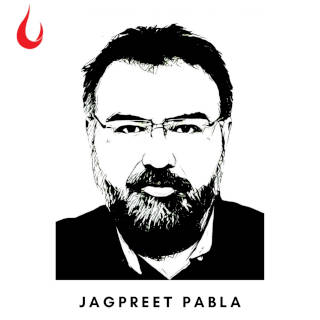
(Jagpreet Pabla is VP - Data Science @ Xelpmoc.in, and co-founder of two companies)
How I got hooked to audiobooks
Christmas day 2018 was our first wedding anniversary. Due to busy schedules we decided to make a quick road dash to Aurangabad and check into a nice hotel to celebrate. Even though, luckily, my wife and I share similar tastes in music, the music just wasn’t cutting it for us that day. During the third rendition of Makeba the wife had a brainwave. She snatched my phone, installed Audible on it, paid the subscription and downloaded Disgrace by J.M. Coetzee.
I’ve been a reader since early childhood. I grew up on Alistair Maclean, Jeffrey Archer and the like. But ever since I co-founded my first startup, my habit of reading books fell off the wagon somewhere along the road. Now, listening to a tale of virtue and vice, strength and weakness, set in South Africa, while driving along a two lane road in rural Maharashtra I could visualize the characters in my head. The narrator, Jack Klaff, who is an actor and an academic, added a whole new dimension to the story with his voice and intonations. The hours passed and we completed Disgrace by the time we came back to Mumbai.
What's working for me (and what's not)
Mumbai is a city of commuters. I used to commute for 2.5 hours daily before the pandemic put a stop to it. I started listening to audiobooks during the commute. Somehow the stop and go traffic disappears when you are listening to a good book. You can’t notice you haven’t really moved for 15 minutes when Jeeves is about to get Bertie out of the clutches of a forced love match (Carry on Jeeves by PG Wodehouse), or when you hear details of how Czechoslovakia was browbeaten into surrendering to Hitler without a fight (The Rise and Fall of the Third Reich by William L Shirer) or when you learn how your brain actually works (Thinking, Fast and Slow by Daniel Kahneman).
One thing I learnt early is that I have no patience for a foreign narrator pronouncing Indian names and terms wrongly (Amritsar: Mrs. Gandhi’s Last Battle by Mark Tully) and am glad there are now more Indian narrators for books about India. Secondly, I need to be away from screens when listening. I can’t surf the web or read WhatsApp forwards and listen to a book at the same time. The visual stimulus is stronger than the aural one.
When the lockdown hit, the commuting stopped. I was in the middle of the second listening of The Hard Thing About Hard Things by Ben Horowitz at the time, which I finished early mornings while doing my morning walks in the shape of 8 in our living room. Once that book was over, I didn’t start another book for several months. Screen time expanded to all my waking hours. When we were allowed to bicycle for pleasure again, I tried listening to audiobooks while bicycling, with special bone conduction headphones that don’t block ambient noise, but realized I prefer being in the moment while on the bicycle. So Audible took backstage and the hum of everyday life took over.
In November 2020, I started going to important client meetings in person again. I dusted off the Audible app and downloaded The Anarchy by William Dalrymple. I’m two-thirds of the way through it and waiting for the next meeting to be confirmed so I can continue listening when going to and coming from the meeting.
Love in the pandemic era
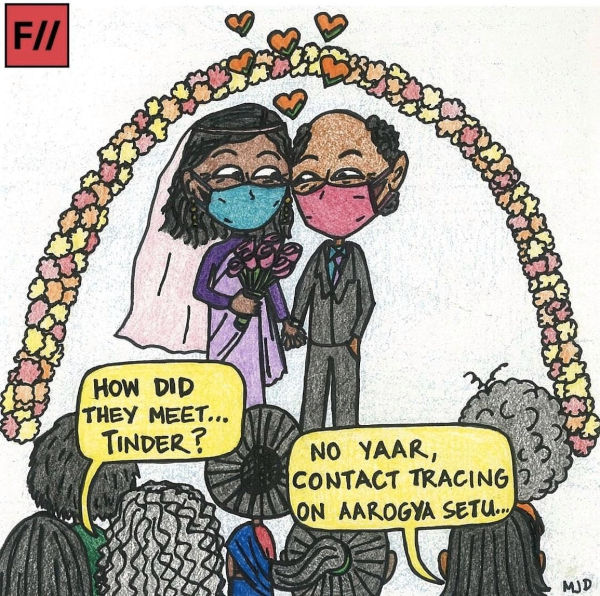
(by Maitri Dore)
Tell us what you think and find noteworthy.
And if you missed previous editions of this newsletter, they’re all archived here.
Bookmark Founding Fuel’s special section on Thriving in Volatile Times. All our stories on how individuals and businesses are responding to the pandemic until now are posted there.
Warm regards,
Team Founding Fuel
